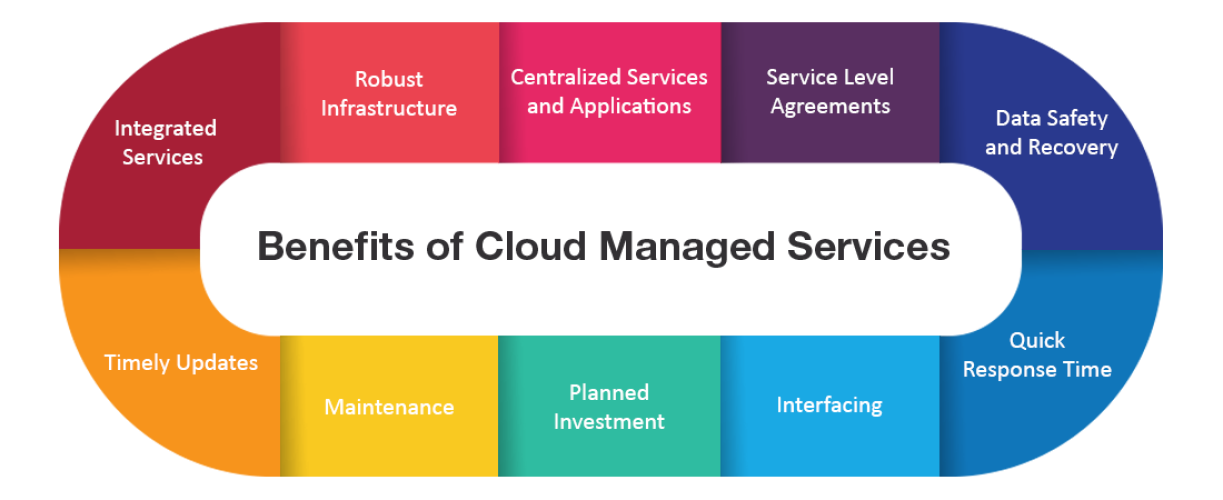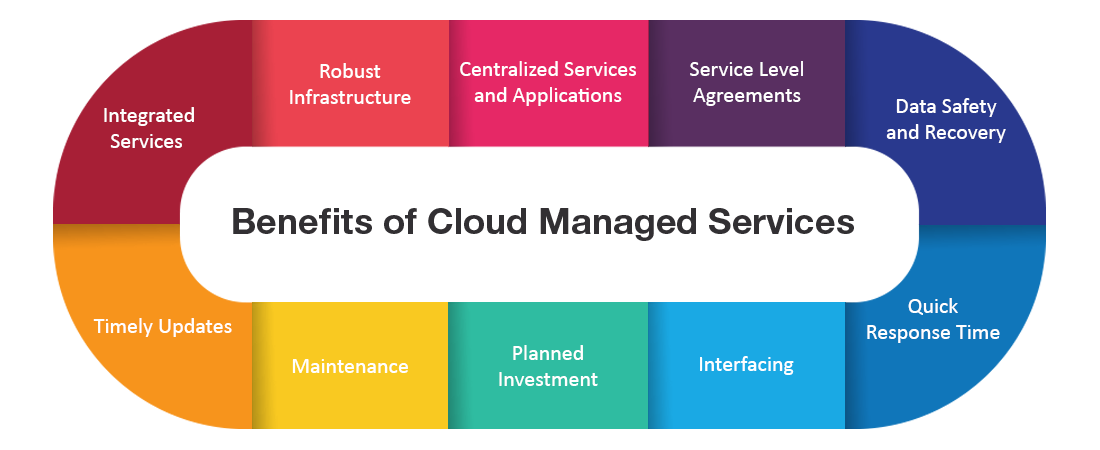
Do Managed IT Services Support Cloud Computing?
Do managed IT services support cloud computing? Well, let's dive right in and find out! You may have heard about managed IT services and cloud computing, but do you know how they work together? In this article, we'll explore the relationship between these two buzzworthy technologies and discover the benefits they bring to businesses. So, get ready to unlock the secrets of managed IT services and the power of the cloud!
Imagine having a team of IT experts at your fingertips, working behind the scenes to support your business operations. That's exactly what managed IT services offer. They provide proactive, round-the-clock monitoring and maintenance of your IT infrastructure, ensuring everything runs smoothly. And when it comes to cloud computing, it's like having a virtual storage space that can be accessed from anywhere, anytime. Sounds pretty cool, right?
But here's the question: Do managed IT services support cloud computing? The answer is a resounding yes! Managed IT services can help you make the most of the cloud by optimizing performance, ensuring data security, and providing expert guidance on cloud strategy. So, if you're ready to take your business to new heights with the power of the cloud, let's explore how managed IT services can support you along the way!

Do Managed IT Services Support Cloud Computing?
Cloud computing has revolutionized the way businesses operate by offering flexible and scalable solutions for data storage and access. With the rise of cloud technology, many businesses are turning to managed IT services to handle their computing needs. In this article, we will delve into the role of managed IT services in supporting cloud computing and explore the benefits and challenges of this partnership.
The Role of Managed IT Services in Cloud Computing
Managed IT services play a crucial role in supporting cloud computing infrastructures for businesses. These services are responsible for managing and maintaining the underlying hardware, software, and network infrastructure required to operate the cloud environment. They ensure that the cloud infrastructure is secure, updated, and optimized for efficient performance.
One of the key responsibilities of managed IT services is to oversee the implementation and integration of cloud solutions into the existing IT infrastructure of a business. This involves assessing the specific needs of the organization, designing a customized cloud architecture, and migrating data and applications to the cloud. Managed IT services also provide ongoing support and monitoring to ensure that the cloud environment operates smoothly and meets the needs of the business.
By leveraging the expertise of managed IT services, businesses can offload the complex and time-consuming tasks associated with managing the cloud infrastructure. This allows the organization to focus on its core competencies and strategic initiatives while enjoying the benefits of cloud computing.
The Benefits of Managed IT Services for Cloud Computing
1. Expertise and Support: Managed IT services bring a wealth of experience and technical knowledge to the table. They have specialized skills in managing cloud environments and can provide expert guidance and support for businesses navigating the complexities of cloud computing.
2. Cost Efficiency: Partnering with managed IT services allows businesses to access enterprise-level IT infrastructure and expertise without the need for significant upfront investments. This cost-effective approach frees up capital that can be allocated to other areas of the business.
3. Scalability and Flexibility: Cloud computing offers unparalleled scalability and flexibility, and managed IT services are well-equipped to handle the dynamic nature of the cloud. They can quickly scale resources up or down based on the changing needs of the business, ensuring optimal performance and cost-efficiency.
4. Enhanced Security: Managing the security of a cloud environment is a complex task that requires specialized knowledge. Managed IT services have robust security measures in place to protect sensitive data and ensure regulatory compliance. They continuously monitor and update security protocols to safeguard against evolving threats.
5. Focus on Core Business: By outsourcing the management of the cloud infrastructure to capable hands, businesses can focus on what they do best - running their operations and serving their customers. Managed IT services shoulder the responsibility of maintaining and optimizing the cloud, allowing the business to concentrate on strategic objectives.
The Challenges of Managed IT Services for Cloud Computing
While there are numerous benefits to leveraging managed IT services for cloud computing, it is essential to understand and address the challenges that may arise. Here are a few common challenges:
1. Vendor Selection: Choosing the right managed IT services provider is crucial. Evaluating potential vendors based on their experience, expertise, and track record can help ensure a successful and reliable partnership.
2. Communication and Collaboration: Effective communication and collaboration between the business and managed IT services provider are vital for seamless integration and ongoing support. Clear expectations, regular updates, and a collaborative approach will contribute to a successful cloud computing strategy.
3. Data Security and Compliance: The security of sensitive data is a top concern when it comes to cloud computing. It is crucial to work with managed IT services that prioritize data security and compliance with industry regulations.
4. Transition and Integration: Migrating existing data and applications to the cloud can be a complex process. Managed IT services play a crucial role in ensuring a smooth transition and integration, minimizing downtime and disruption to business operations.
5. Ongoing Support and Maintenance: Regular monitoring, maintenance, and troubleshooting are essential to keep the cloud environment running smoothly. Choosing a managed IT services provider that offers comprehensive support and proactive maintenance is crucial for uninterrupted business operations.
In conclusion, managed IT services play a vital role in supporting cloud computing by managing and optimizing the underlying infrastructure. Businesses can benefit from the expertise, support, cost-efficiency, scalability, and enhanced security that managed IT services offer. However, careful vendor selection, effective communication, and attention to data security and ongoing support are crucial for a successful partnership. By leveraging the strengths of managed IT services, businesses can fully harness the power of cloud computing for their operations.
Key Takeaways: Do Managed IT Services Support Cloud Computing?
- Managed IT services can provide support for implementing, managing, and optimizing cloud computing systems.
- Cloud computing allows businesses to access and store data, applications, and resources on remote servers over the internet.
- Managed IT services can help businesses choose the right cloud computing solutions based on their specific needs and budget.
- Managed IT service providers can handle the technical aspects of cloud computing, including security, maintenance, and updates.
- By outsourcing cloud computing management to a managed IT service provider, businesses can focus on their core operations and rely on experts for IT support.
Frequently Asked Questions
Welcome to our FAQ section on managed IT services and cloud computing. Here are some common questions and answers to help you understand how managed IT services support cloud computing.
1. Can managed IT services help businesses migrate their data to the cloud?
Absolutely! Managed IT services are well-equipped to assist businesses in migrating their data to the cloud. They have the expertise and resources to evaluate your current infrastructure, identify the best cloud solutions for your needs, and seamlessly migrate your data to the cloud. Managed IT service providers will ensure that your data is transferred securely and efficiently without disrupting your daily operations. They can also help you optimize your cloud environment, making it more cost-effective and scalable.
With the help of managed IT services, businesses can leverage the benefits of cloud computing, such as increased flexibility, enhanced collaboration, and improved data security, without the complexities and challenges of managing the transition on their own.
2. Do managed IT services offer support for cloud-based applications?
Yes, managed IT services provide comprehensive support for cloud-based applications. They can help you select, set up, and maintain the right cloud-based applications for your business needs. Whether you require productivity tools, customer relationship management systems, or collaboration platforms, managed IT services will assist you in choosing the most suitable cloud-based applications and ensure seamless integration with your existing infrastructure.
Besides initial implementation, managed IT service providers continuously monitor and manage your cloud-based applications, ensuring optimal performance and addressing any issues that arise. They also provide user support, training, and assistance, ensuring that your employees are proficient in using these applications and maximizing their productivity.
3. Are managed IT services responsible for data backup and disaster recovery in the cloud?
Yes, managed IT services take responsibility for data backup and disaster recovery in the cloud. They implement robust backup strategies and disaster recovery plans, ensuring that your data is protected and can be swiftly restored in the event of an unforeseen incident or system failure.
Managed IT service providers employ industry best practices to secure your data, including regular data backups, encryption, and redundancies to minimize the risk of data loss. They also conduct routine testing and simulations to verify the effectiveness of their backup and recovery procedures, further safeguarding your critical information.
4. Can managed IT services help businesses optimize their cloud infrastructure costs?
Absolutely! Managed IT services are experts at optimizing cloud infrastructure costs for businesses. They closely monitor your cloud usage, identify areas of inefficiency or overspending, and suggest cost-saving measures. These measures may include rightsizing resources, optimizing storage, implementing automation, or adopting alternative cloud deployment models.
By thoroughly analyzing your cloud infrastructure and making data-driven recommendations, managed IT service providers can help you achieve cost optimization without compromising performance or security. They continuously monitor your cloud environment, ensuring that you are maximizing your return on investment and making the most efficient use of your cloud resources.
5. Can managed IT services provide cybersecurity solutions for cloud computing?
Indeed! Managed IT services play a crucial role in providing cybersecurity solutions for cloud computing. They employ a multi-layered approach to protect your cloud infrastructure and data from cyber threats. This includes implementing advanced firewall and intrusion detection systems, deploying encryption and access controls, and regularly patching and updating your cloud environment.
Managed IT service providers also conduct regular security audits and assessments to identify vulnerabilities and mitigate potential risks. They stay up-to-date with the latest security threats and trends, ensuring that your cloud environment is protected against emerging cyber threats. By partnering with managed IT services, businesses can enhance the security of their cloud infrastructure and have peace of mind knowing that their data is well-protected.
Managed IT Services for Business - IT Support Explained
Summary
So, basically, managed IT services can really help with cloud computing. They take care of all the technical stuff, like maintenance and security. Plus, they can provide expert advice and support to make sure everything runs smoothly. With managed IT services, you can focus on your business and let them handle the cloud.
In conclusion, if you're thinking about using the cloud for your business, it's a good idea to consider managed IT services. They can make your life easier and ensure that your cloud computing experience is hassle-free. So, go ahead and explore the possibilities of the cloud with the support of managed IT services.
Recent Posts
- How Does GPON Improve Network Efficiency?
- What Are The Advantages Of GPON?
- What Are The Benefits Of IT Outsourcing?
- What's The Deal With Ransomware Attacks?
- Are GPON Providers Widely Available?
- What's GPON's Impact On Bandwidth?
- Why Is Multi-Factor Authentication Important?
- How To Ensure Data Privacy Compliance?
 Blogs
Blogs Infographics
Infographics Videos
Videos Podcasts
Podcasts Case Studies
Case Studies Call For Quote
Call For Quote